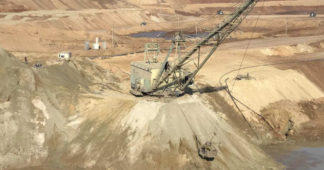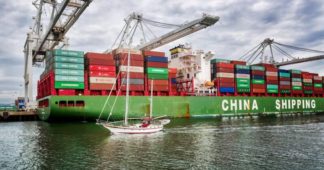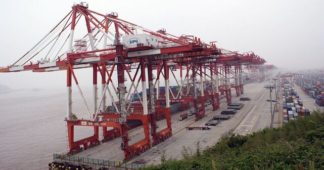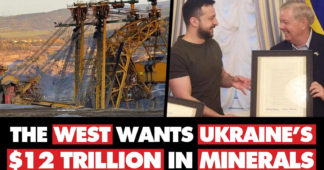China hits back at Trump by tightening exports of rare earths
Apr. 14, 2025
China has taken a significant step in the intensifying economic war with the US by moving to tighten controls on the export of rare earth minerals and magnets critical for many advanced technologies in auto production, electronics and military equipment. Restrictions had already been imposed on the exports of some rare earths as the Trump tariff war has escalated, but the latest moves appear to be the most significant retaliatory measure so far.
According to a report in the New York Times by its Beijing bureau chief Keith Bradsher published yesterday, shipments of magnets “essential for assembling everything from cars and drones to robots and missiles, have been halted at many Chinese ports while the Chinese government drafts a new regulatory system. Once in place, the new system could permanently prevent supplies from reaching certain companies, including American military contractors.”
On April 4, two days after Trump’s announcement of his “reciprocal tariff” war—since suspended for all countries for 90 days except China for which tariffs have been raised in 145 percent—Beijing ordered restrictions on the export of six heavy rare earth metals refined in China and rare earth magnets.
The magnets are crucial for the production of electric motors for cars and other products. China produces around 90 percent of the 200,000 tonnes of rare earth magnets each year. Japan produces a large portion of the rest while a small quantity, dependent on China for raw material supplies, comes from Germany.
The Times article cited comments by Daniel Pickard, an adviser to the US trade representative and the Commerce Department on critical minerals. “Does the export control or ban potentially have severe effects in the US? Yes,” he said.
James Litinsky, the chief executive of MP Materials which supplies rare earths, said supplies to military contractors were of particular concern. “Drones and robotics are widely considered the future of warfare, and based on everything we are seeing, the critical inputs for our future supply chain are shut down.”
MP Materials owns the only sole rare earths mine in the US, Mountain Pass in California.
The key issue is not so much obtaining supplies of rare earths and critical minerals but in processing them. The US has considerable supplies of rare earths. Getting them out of the ground is one thing, processing and refining them is another.
Rare earths can be found all over the world but often not in sufficient concentrations to make mining them economically viable. And the refinement process itself is complex and expensive because the rare earths are found in combination with minerals having similar chemical properties, which makes it difficult to extract them.
An article in the Financial Times in early March cited remarks by Pierre Josso, deputy director of the UK Critical Minerals Intelligence Centre, who pointed to this issue. “Refining is where things become difficult. Managing to separate them into individual elements takes a lot of time and energy. You can mine anywhere in the world, but if you don’t build the smelting and refining capacity, you’ll send your ore to China to be refined,” he said.
The US at present mines about 12 percent of the world’s supply of rare earths, putting it second only to China, according to the United States Geological Survey. But refining is capital intensive and not particularly profitable and so China is the main center for processing.
An article in the Wall Street Journal in March noted that the “US exports about two-thirds of its rare earths to China. It has little choice: China is responsible for around 85 percent of the world’s rare earth refining. Chinese companies then turn the ore into the final product—rare-earth magnets—and export the magnets back to the US.”
According to Morgan Bazilian, director of the Payne Institute at the Colorado Institute of Mines, whose remarks were cited in the article, the so-called “midstream piece of processing and refining ores into chemicals and metals is really important and dominated by China. I don’t see it becoming undominated.”
His remarks are borne out by the data. According to industry estimates, the cost of building a refinery plant in China is one-third of the cost in the US.
Industrial dominance goes beyond rare earths and extends to cobalt and copper. The top six refiners of cobalt—vital for military industries and batteries—are Chinese. China’s share of the production of refined cobalt is estimated to have grown from 65 percent in 2018 to 83 percent in 2024.
In copper, crucial for all areas of electronics, US refining capacity lags behind China and the Trump administration has initiated an investigation into how dependence on imports of the metal is a threat to US “national security.”
The issue of rare earths and its importance for US military capacity has concerned Trump for some time. In 2017 he signed an executive order to secure supplies of critical minerals and issued another in 2020 regarding Chinese dominance.
In his address to the joint session of Congress in March, Trump said he planned “historic action to dramatically expand production of critical minerals and rare earths.” These minerals are part of his drive to annex Greenland and were at the center of his proposed agreement with Ukraine.
For its part, the actions of the Chinese government to tighten its grip on their supply and the magnets it produces is another indication that President Xi Jinping considers that whatever the short-term problems caused by the Trump tariffs—and they will be significant—over the longer haul China is in a stronger position than the US.
Such views will have been buttressed by the turbulence in financial markets, centered on the $29 trillion bond market, and the growing international sentiment that the US is no longer a safe haven for investment.
Significantly, while Trump has boasted of a line of countries “kissing my ass” in order to enter negotiations and make trade deals, China is not among them and Xi has not sought a phone call. The view in Beijing appears to be that despite being virtually shut out of the US market, any blow on that score will be able to be countered by boosting its domestic market with government stimulus measures.
The latest response by China is not likely, however, to produce any lasting US economic concessions, despite urging by financial oligarchs, such as billionaire founder of the Bridgewater hedge fund Ray Dalio, for a “win-win” US-China trade deal.
Given its lag on the production front, sharply expressed in the refining of critical minerals but present in many other areas of manufacturing as well, the response of the Trump regime will be to step up preparations in the one area where it considers it has superiority, that is, through war.
We remind our readers that publication of articles on our site does not mean that we agree with what is written. Our policy is to publish anything which we consider of interest, so as to assist our readers in forming their opinions. Sometimes we even publish articles with which we totally disagree, since we believe it is important for our readers to be informed on as wide a spectrum of views as possible.











